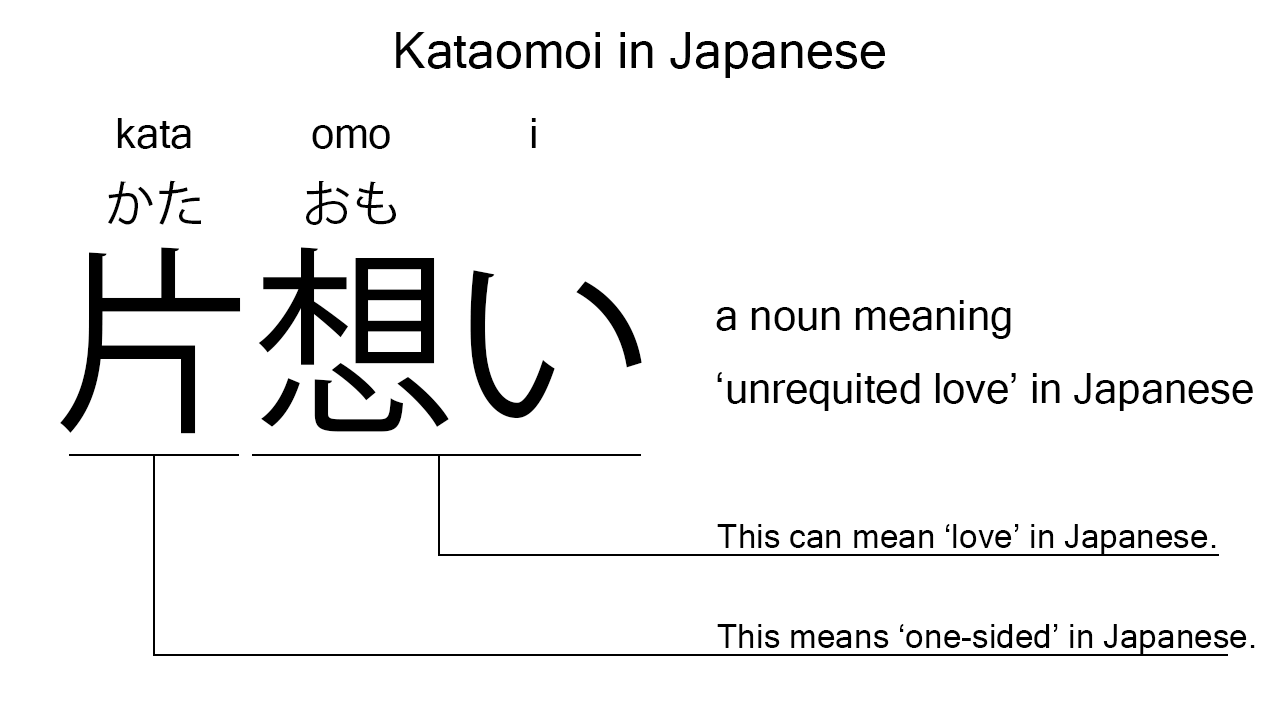What does “kataomoi” mean in Japanese?
Native speakers use kataomoi to mean ‘unrequited love’ in Japanese. Perhaps, some Japanese learners know this word as it is sometimes used in Japanese movies, songs, novels, manga, anime, and the like. In this blog post, however, I’m explaining this word in detail based on its kanji characters. And also, I’m explaining how to use it through example sentences. My explanations would help Japanese learners understand kataomoi more clearly. Then, let’s get started!
Contents
Definition and meaning of “kataomoi”
Let me start with the definition and meaning of kataomoi.
- kataomoi – 片想い (かたおもい) : a noun meaning ‘unrequited love’ in Japanese.
Native speakers use this noun to refer to the feeling of love which is one sided and not returned. So, the usage is similar to that of the English phrase, unrequited love, I think.
The definition and meaning are simple and clear. To understand this noun more clearly, however, let me explain its kanji characters in detail, one by one.
Kataomoi in kanji
The kanji expression of kataomoi contains the following two kanji characters:
- 片 : a kanji character often used as a prefix to add the meaning of ‘one-sided’, ‘one way’, ‘one of a pair’, or such.
- 想 : a kanji character used to mean a ‘thought’, ‘feeling’, or sometimes ‘love’ in Japanese.
From these two kanji characters, we can understand that kataomoi literally means ‘one-sided love’ in Japanese. This literal interpretation is completely in line with the actual meaning, I think. Unrequited love is usually one sided.

When we meet new Japanese words, we should check their kanji characters in detail to understand their meanings clearly and deeply. In many cases, kanji characters tell us a lot about the meanings of the words they form. Actually, here, we could get the better understanding of kataomoi through the detailed kanji check above.
So far, I’ve explained the definition and meaning of kataomoi together with its kanji characters. Then, let me explain how to use it through the example sentences below.
How to say “unrequited love” in Japanese
are wa boku no kataomoi deshi ta – あれは僕の片想いでした (あれはぼくのかたおもいでした)
That was my unrequited love.
Below are the new words used in the example sentence.
- are – あれ : a pronoun used to refer to something not close to the speaker. In the example, this is used to mean ‘that’ in Japanese.
- wa – は : a binding particle working as a case marker or topic marker. In the example, this works after are to make the subject in the sentence.
- boku – 僕 (ぼく) : a pronoun meaning ‘I’ in Japanese. This is used mainly by boys and young males.
- no – の : a case particle used after a noun or pronoun to make its possessive case. In the example, this is used after boku to make its possessive case, boku no, which means ‘my’ in Japanese.
- deshi – でし : one conjugation of the auxiliary verb, desu, which is used after a noun or adjective to make it polite. In the example, it has been conjugated for the better connection with its following word.
- ta – た : an auxiliary verb used after a verb, adjective, or auxiliary verb to make its past tense form. Probably, this is well known as a part of Japanese ta form. In the example, this is used after deshi to make its past tense form, deshi ta.
This is a typical usage of kataomoi. In this example, it works as a part of the noun phrase, boku no kataomoi, which means ‘my unrequited love’ in Japanese.
Another example of “kataomoi”
「kataomoi wa totemo tsurai」to kare ga it ta – 「片想いはとても辛い」と彼が言った (「かたおもいはとてもつらい」とかれがいった)
“Unrequited love is so painful,” he said.
Below are the new words used in the example sentence.
- totemo – とても : an adverb of degree meaning ‘very’, ‘much’, ‘so’, or such in Japanese. In the example, this works in front of tsurai to emphasize its meaning.
- tsurai – 辛い (つらい) : an i-adjective meaning ‘painful’ or such in Japanese.
- to – と : a case particle working as a quote marker. In the example, this works after the clause, kataomoi wa totemo tsurai, to indicate what he said.
- kare – 彼 (かれ) : a pronoun meaning ‘he’ in Japanese.
- ga – が : a case particle used to make the subject word or the object word in a sentence. In the example, this is used after kare to make the subject in the sentence.
- it – 言っ (いっ) : one conjugation of the verb, iu, which means ‘to say’, ‘to tell’, or such in Japanese. In the example, it has been conjugated for the better connection with its following word.
This is another example of kataomoi. In this example, it works together with wa to become the subject in the clause. When we want to mean ‘unrequited love’ in Japanese, anyway, this noun is always a very good option.
Summary
In this blog post, I’ve explained the definition and meaning of kataomoi in detail based on its kanji characters. And also, I’ve explained how to use it through the example sentences. Let me summarize them as follows.
- kataomoi – 片想い (かたおもい) : a noun meaning ‘unrequited love’ in Japanese. Native speakers use this noun to refer to the feeling of love which is one sided and not returned. So, the usage is similar to that of the English phrase, unrequited love, I think. This kanji expression contains two kanji characters, 片 and 想, which literally mean ‘one-sided love’ in Japanese. This literal interpretation is completely in line with the actual meaning. Unrequited love is usually one sided.
Hope my explanations are understandable and helpful for Japanese learners.
Leave a Reply